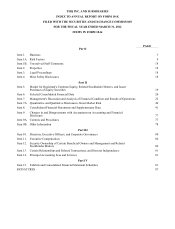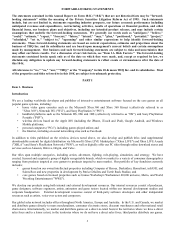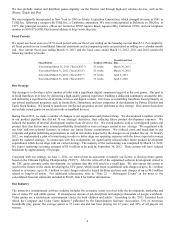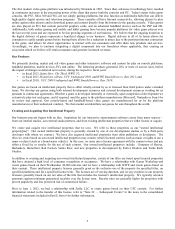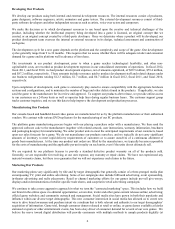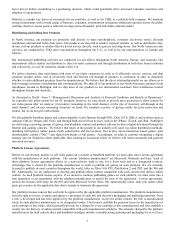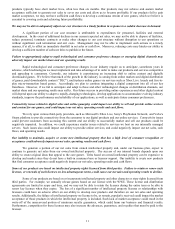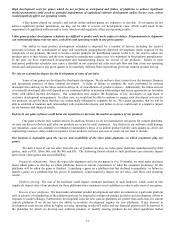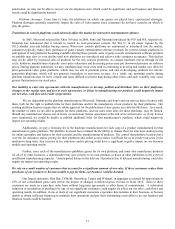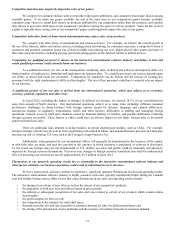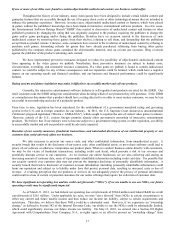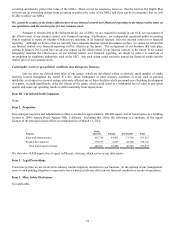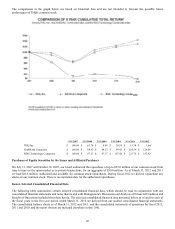THQ 2012 Annual Report Download - page 19
Download and view the complete annual report
Please find page 19 of the 2012 THQ annual report below. You can navigate through the pages in the report by either clicking on the pages listed below, or by using the keyword search tool below to find specific information within the annual report.11
products typically have short market lives, often less than six months. Our products may not achieve and sustain market
acceptance sufficient to generate net sales to cover our costs and allow us to become profitable. If our products fail to gain
market acceptance, we may not have sufficient cash flows to develop a continuous stream of new games, which we believe is
essential to covering costs and achieving future profitability.
We may not be able to adequately adjust our cost structure in a timely fashion in response to a sudden decrease in demand.
A significant portion of our cost structure is attributable to expenditures for personnel, facilities and external
development. In the event of additional declines in our current expected net sales, we may not be able to dispose of facilities,
reduce personnel, terminate contracts or make other changes to our cost structure without disruption to our operations or
without significant cash termination and exit costs. Management may not be able to implement such actions in a timely
manner, if at all, to offset an immediate shortfall in net sales or cash flow. Moreover, reducing costs may hinder our ability to
develop a sufficient number of software titles to publish in the future.
Failure to appropriately adapt to rapid technological and consumer preference changes or emerging digital channels may
adversely impact our market share and our operating results.
Rapid technological and consumer preference changes in our industry require us to anticipate, sometimes years in
advance, which technologies we must implement and take advantage of in order to make our products and services competitive
and appealing to consumers. Currently, our industry is experiencing an increasing shift to online content and digitally
downloaded games. We believe that much of the growth in the industry is coming from online markets and digital distribution
of games, paid downloadable content ("DLC"), multi-player online games via services such as Xbox Live Arcade and free-to-
play micro-transaction based games. Accordingly, we plan to continue integrating a digital component into all of our key
franchises. However, if we fail to anticipate and adapt to these and other technological changes or distribution channels, our
market share and our operating results may suffer. Our future success in providing online experiences and other digital content
will depend upon our ability to adapt to rapidly-changing technologies, develop applications to accommodate evolving industry
standards, improve the performance and reliability of our applications, as well as anticipate future consumer preferences.
Connectivity issues related to digital sales and online gameplay could impact our ability to sell and provide online services
and content for our games, and could impact our net sales, operating results and cash flows.
We rely upon various third-party providers, such as Microsoft's Xbox Live, Sony's PlayStation Network, and Valve's
Steam platform to provide connectivity from the consumer to our digital products and our online services. Connectivity issues
could prevent customers from accessing this content and our ability to successfully market and sell our products could be
negatively impacted. In addition, we could experience similar issues related to services we host on our internally managed
servers. Such issues also could impact our ability to provide online services, and could negatively impact our net sales, cash
flows, and operating results.
Our inability to maintain, acquire or create new intellectual property that has a high level of consumer recognition or
acceptance could adversely impact our net sales, operating results and cash flows.
We generate a portion of our net sales from owned intellectual property and, under our business plan, expect to
continue to generate net sales from our owned intellectual property. The success of our internal brands depends upon our
ability to create original ideas that appeal to the core gamer. Titles based on owned intellectual property can be expensive to
develop and market since they do not have a built-in consumer base or licensor support. Our inability to create new products
that find consumer acceptance could negatively impact our net sales, operating results and cash flows.
Some of our products are based on intellectual property rights licensed from third parties. Failure to retain or renew such
licenses, or renewals of such licenses on less advantageous terms, could cause our net sales and operating results to decline.
Some of our products are based on or incorporate intellectual property and other character or story rights licensed from
third parties. For example, we annually release games based on our license with the WWE. These license and distribution
agreements are limited in scope and time, and we may not be able to retain the licenses during the entire term or be able to
renew key licenses when they expire. The loss of a significant number of intellectual property licenses or relationships with
licensors could have an adverse effect on our ability to develop new products and therefore on our net sales and operating
results. Additionally, the failure of intellectual property we license to be, or remain, popularly received could impact the market
acceptance of those products in which the intellectual property is included. Such lack of market acceptance could result in the
write-off of the unrecovered portion of minimum royalty guarantees, which could harm our business and financial results.
Furthermore, competition for these licenses may also increase the advances, guarantees, and royalties that must be paid to the
licensor.


